HRM Report: Skills, CPD, and Performance Analysis at Alexandra-Reisse
VerifiedAdded on 2021/02/21
|14
|3761
|34
Report
AI Summary
This report analyzes human resource management (HRM) practices within Alexandra-Reisse, a finance organization. It defines HRM, explores essential employee skills, knowledge, and behaviors, and highlights the importance of continuous professional development (CPD). The report includes a personal skill audit, identifies skill gaps, and presents a professional development plan. It differentiates between organizational and individual learning, training, and development, emphasizing the need for continuous learning to drive sustainable development. The report applies learning cycle theories to analyze CPD implementation and barriers and defines and analyzes performance management approaches. The report concludes by discussing how performance management, collaborative working, and effective communication support high-performance and commitment. The report emphasizes the importance of HRM practices for organizational success. This report is available on Desklib, a platform providing AI-based study tools for students.

HPW
Paraphrase This Document
Need a fresh take? Get an instant paraphrase of this document with our AI Paraphraser
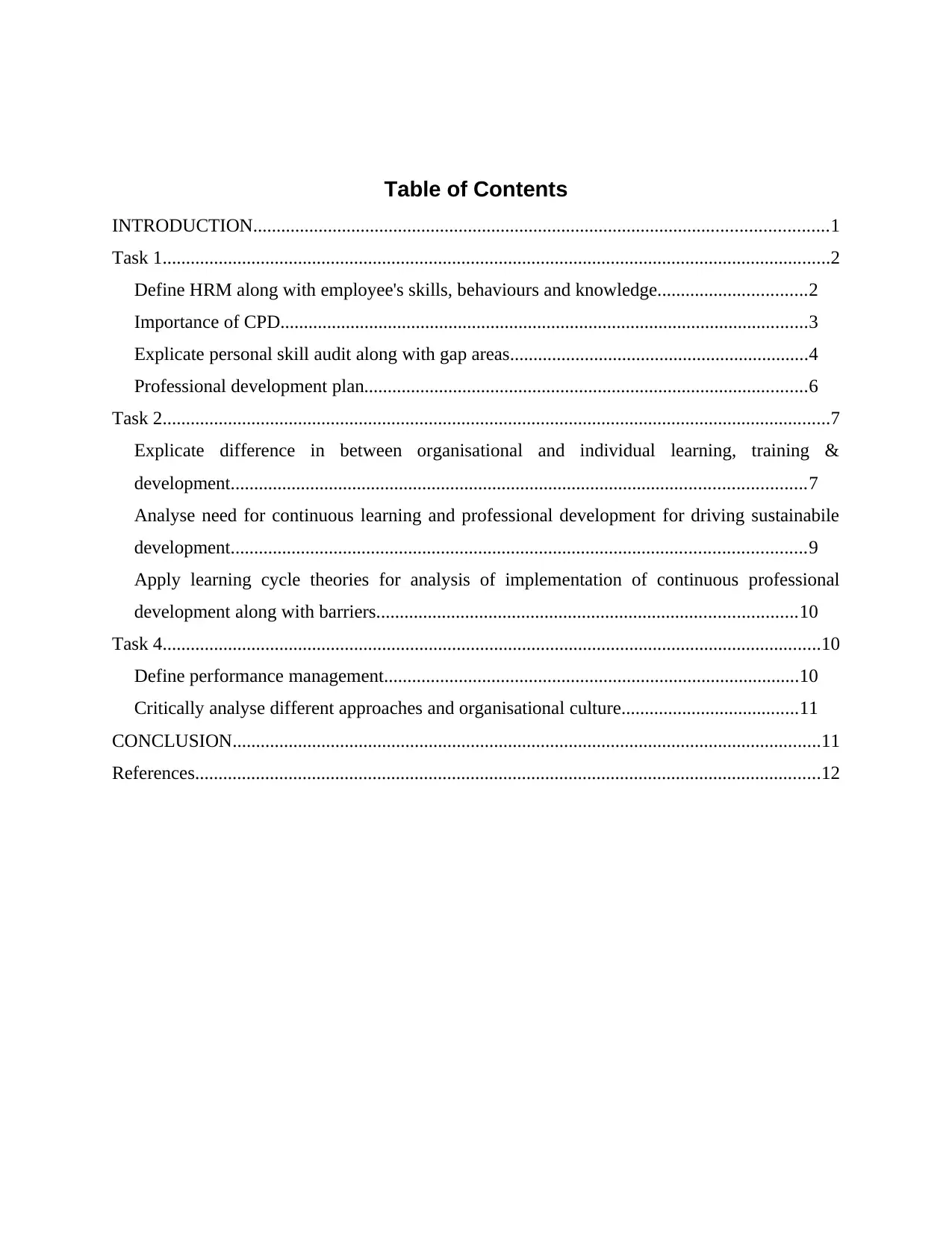
Table of Contents
INTRODUCTION...........................................................................................................................1
Task 1...............................................................................................................................................2
Define HRM along with employee's skills, behaviours and knowledge................................2
Importance of CPD.................................................................................................................3
Explicate personal skill audit along with gap areas................................................................4
Professional development plan...............................................................................................6
Task 2...............................................................................................................................................7
Explicate difference in between organisational and individual learning, training &
development...........................................................................................................................7
Analyse need for continuous learning and professional development for driving sustainabile
development...........................................................................................................................9
Apply learning cycle theories for analysis of implementation of continuous professional
development along with barriers..........................................................................................10
Task 4.............................................................................................................................................10
Define performance management.........................................................................................10
Critically analyse different approaches and organisational culture......................................11
CONCLUSION..............................................................................................................................11
References......................................................................................................................................12
INTRODUCTION...........................................................................................................................1
Task 1...............................................................................................................................................2
Define HRM along with employee's skills, behaviours and knowledge................................2
Importance of CPD.................................................................................................................3
Explicate personal skill audit along with gap areas................................................................4
Professional development plan...............................................................................................6
Task 2...............................................................................................................................................7
Explicate difference in between organisational and individual learning, training &
development...........................................................................................................................7
Analyse need for continuous learning and professional development for driving sustainabile
development...........................................................................................................................9
Apply learning cycle theories for analysis of implementation of continuous professional
development along with barriers..........................................................................................10
Task 4.............................................................................................................................................10
Define performance management.........................................................................................10
Critically analyse different approaches and organisational culture......................................11
CONCLUSION..............................................................................................................................11
References......................................................................................................................................12
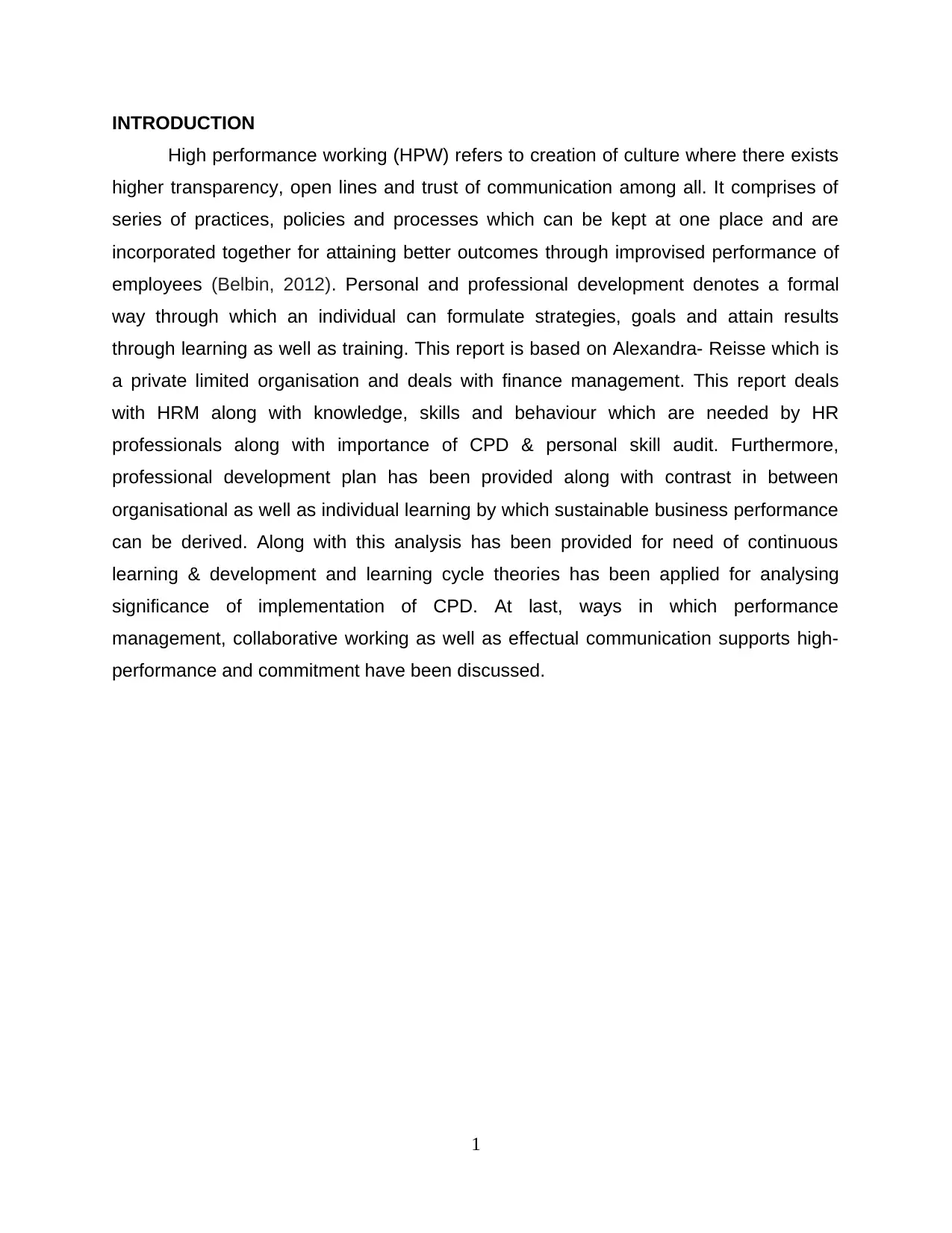
INTRODUCTION
High performance working (HPW) refers to creation of culture where there exists
higher transparency, open lines and trust of communication among all. It comprises of
series of practices, policies and processes which can be kept at one place and are
incorporated together for attaining better outcomes through improvised performance of
employees (Belbin, 2012). Personal and professional development denotes a formal
way through which an individual can formulate strategies, goals and attain results
through learning as well as training. This report is based on Alexandra- Reisse which is
a private limited organisation and deals with finance management. This report deals
with HRM along with knowledge, skills and behaviour which are needed by HR
professionals along with importance of CPD & personal skill audit. Furthermore,
professional development plan has been provided along with contrast in between
organisational as well as individual learning by which sustainable business performance
can be derived. Along with this analysis has been provided for need of continuous
learning & development and learning cycle theories has been applied for analysing
significance of implementation of CPD. At last, ways in which performance
management, collaborative working as well as effectual communication supports high-
performance and commitment have been discussed.
1
High performance working (HPW) refers to creation of culture where there exists
higher transparency, open lines and trust of communication among all. It comprises of
series of practices, policies and processes which can be kept at one place and are
incorporated together for attaining better outcomes through improvised performance of
employees (Belbin, 2012). Personal and professional development denotes a formal
way through which an individual can formulate strategies, goals and attain results
through learning as well as training. This report is based on Alexandra- Reisse which is
a private limited organisation and deals with finance management. This report deals
with HRM along with knowledge, skills and behaviour which are needed by HR
professionals along with importance of CPD & personal skill audit. Furthermore,
professional development plan has been provided along with contrast in between
organisational as well as individual learning by which sustainable business performance
can be derived. Along with this analysis has been provided for need of continuous
learning & development and learning cycle theories has been applied for analysing
significance of implementation of CPD. At last, ways in which performance
management, collaborative working as well as effectual communication supports high-
performance and commitment have been discussed.
1
⊘ This is a preview!⊘
Do you want full access?
Subscribe today to unlock all pages.

Trusted by 1+ million students worldwide
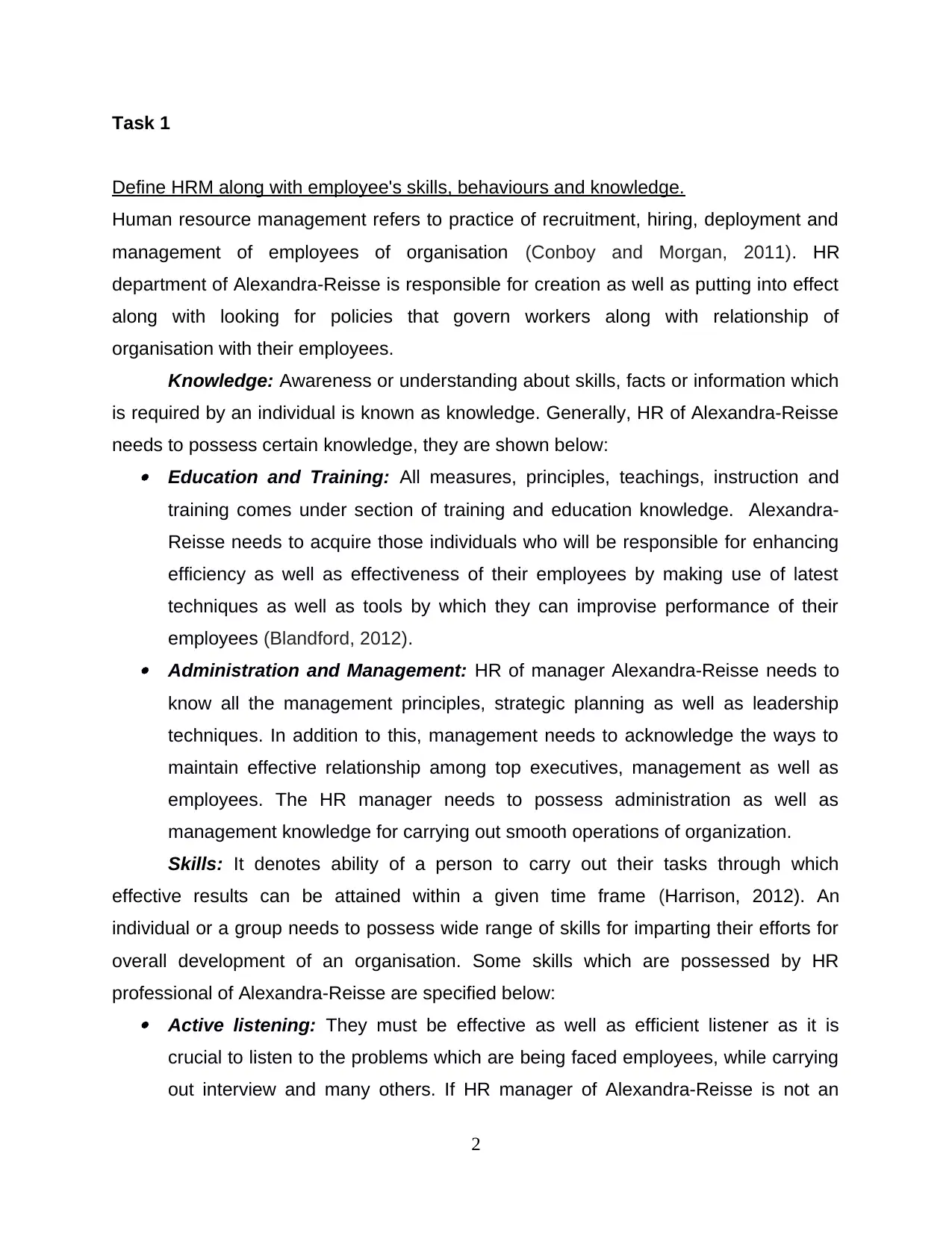
Task 1
Define HRM along with employee's skills, behaviours and knowledge.
Human resource management refers to practice of recruitment, hiring, deployment and
management of employees of organisation (Conboy and Morgan, 2011). HR
department of Alexandra-Reisse is responsible for creation as well as putting into effect
along with looking for policies that govern workers along with relationship of
organisation with their employees.
Knowledge: Awareness or understanding about skills, facts or information which
is required by an individual is known as knowledge. Generally, HR of Alexandra-Reisse
needs to possess certain knowledge, they are shown below: Education and Training: All measures, principles, teachings, instruction and
training comes under section of training and education knowledge. Alexandra-
Reisse needs to acquire those individuals who will be responsible for enhancing
efficiency as well as effectiveness of their employees by making use of latest
techniques as well as tools by which they can improvise performance of their
employees (Blandford, 2012). Administration and Management: HR of manager Alexandra-Reisse needs to
know all the management principles, strategic planning as well as leadership
techniques. In addition to this, management needs to acknowledge the ways to
maintain effective relationship among top executives, management as well as
employees. The HR manager needs to possess administration as well as
management knowledge for carrying out smooth operations of organization.
Skills: It denotes ability of a person to carry out their tasks through which
effective results can be attained within a given time frame (Harrison, 2012). An
individual or a group needs to possess wide range of skills for imparting their efforts for
overall development of an organisation. Some skills which are possessed by HR
professional of Alexandra-Reisse are specified below: Active listening: They must be effective as well as efficient listener as it is
crucial to listen to the problems which are being faced employees, while carrying
out interview and many others. If HR manager of Alexandra-Reisse is not an
2
Define HRM along with employee's skills, behaviours and knowledge.
Human resource management refers to practice of recruitment, hiring, deployment and
management of employees of organisation (Conboy and Morgan, 2011). HR
department of Alexandra-Reisse is responsible for creation as well as putting into effect
along with looking for policies that govern workers along with relationship of
organisation with their employees.
Knowledge: Awareness or understanding about skills, facts or information which
is required by an individual is known as knowledge. Generally, HR of Alexandra-Reisse
needs to possess certain knowledge, they are shown below: Education and Training: All measures, principles, teachings, instruction and
training comes under section of training and education knowledge. Alexandra-
Reisse needs to acquire those individuals who will be responsible for enhancing
efficiency as well as effectiveness of their employees by making use of latest
techniques as well as tools by which they can improvise performance of their
employees (Blandford, 2012). Administration and Management: HR of manager Alexandra-Reisse needs to
know all the management principles, strategic planning as well as leadership
techniques. In addition to this, management needs to acknowledge the ways to
maintain effective relationship among top executives, management as well as
employees. The HR manager needs to possess administration as well as
management knowledge for carrying out smooth operations of organization.
Skills: It denotes ability of a person to carry out their tasks through which
effective results can be attained within a given time frame (Harrison, 2012). An
individual or a group needs to possess wide range of skills for imparting their efforts for
overall development of an organisation. Some skills which are possessed by HR
professional of Alexandra-Reisse are specified below: Active listening: They must be effective as well as efficient listener as it is
crucial to listen to the problems which are being faced employees, while carrying
out interview and many others. If HR manager of Alexandra-Reisse is not an
2
Paraphrase This Document
Need a fresh take? Get an instant paraphrase of this document with our AI Paraphraser
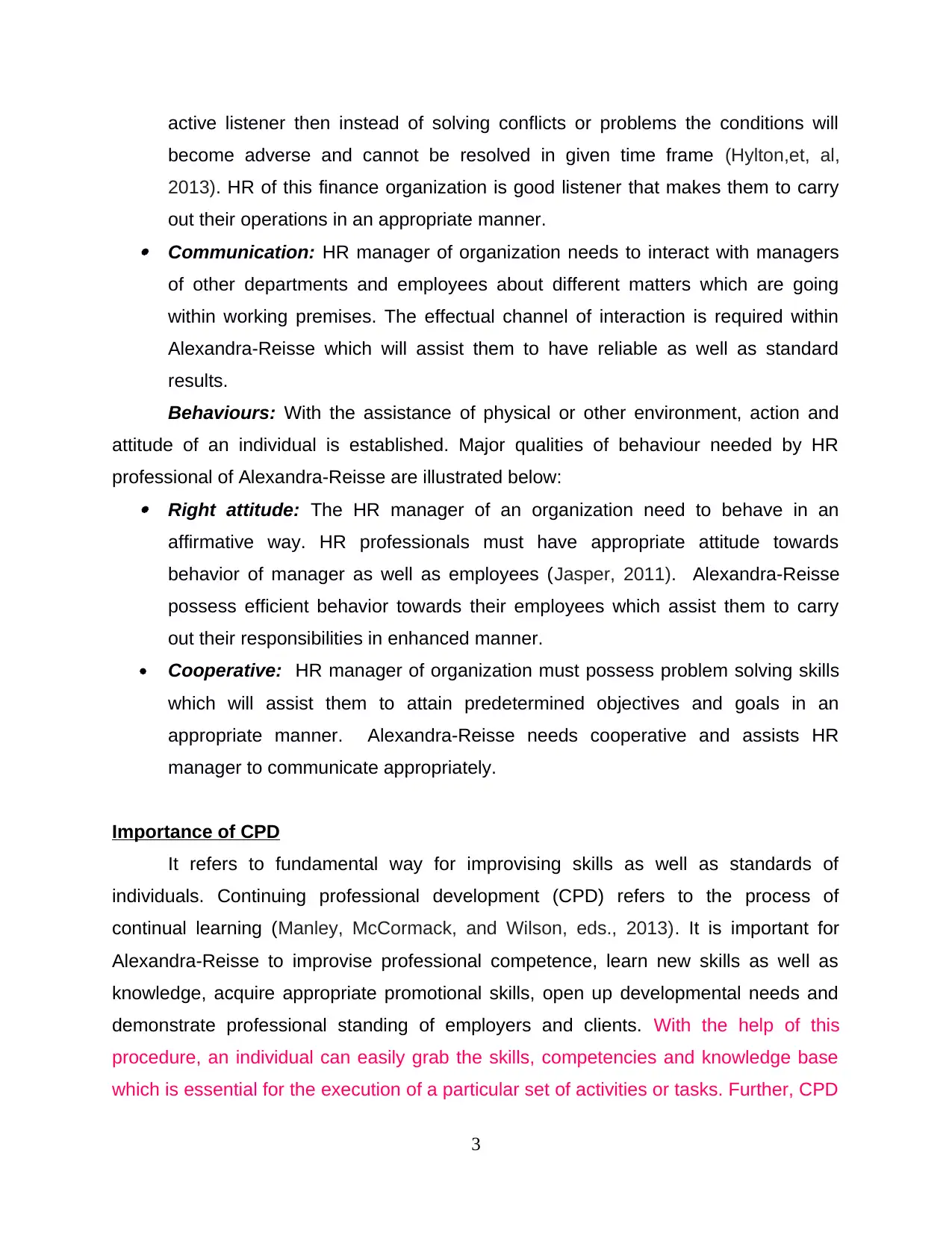
active listener then instead of solving conflicts or problems the conditions will
become adverse and cannot be resolved in given time frame (Hylton,et, al,
2013). HR of this finance organization is good listener that makes them to carry
out their operations in an appropriate manner. Communication: HR manager of organization needs to interact with managers
of other departments and employees about different matters which are going
within working premises. The effectual channel of interaction is required within
Alexandra-Reisse which will assist them to have reliable as well as standard
results.
Behaviours: With the assistance of physical or other environment, action and
attitude of an individual is established. Major qualities of behaviour needed by HR
professional of Alexandra-Reisse are illustrated below: Right attitude: The HR manager of an organization need to behave in an
affirmative way. HR professionals must have appropriate attitude towards
behavior of manager as well as employees (Jasper, 2011). Alexandra-Reisse
possess efficient behavior towards their employees which assist them to carry
out their responsibilities in enhanced manner.
Cooperative: HR manager of organization must possess problem solving skills
which will assist them to attain predetermined objectives and goals in an
appropriate manner. Alexandra-Reisse needs cooperative and assists HR
manager to communicate appropriately.
Importance of CPD
It refers to fundamental way for improvising skills as well as standards of
individuals. Continuing professional development (CPD) refers to the process of
continual learning (Manley, McCormack, and Wilson, eds., 2013). It is important for
Alexandra-Reisse to improvise professional competence, learn new skills as well as
knowledge, acquire appropriate promotional skills, open up developmental needs and
demonstrate professional standing of employers and clients. With the help of this
procedure, an individual can easily grab the skills, competencies and knowledge base
which is essential for the execution of a particular set of activities or tasks. Further, CPD
3
become adverse and cannot be resolved in given time frame (Hylton,et, al,
2013). HR of this finance organization is good listener that makes them to carry
out their operations in an appropriate manner. Communication: HR manager of organization needs to interact with managers
of other departments and employees about different matters which are going
within working premises. The effectual channel of interaction is required within
Alexandra-Reisse which will assist them to have reliable as well as standard
results.
Behaviours: With the assistance of physical or other environment, action and
attitude of an individual is established. Major qualities of behaviour needed by HR
professional of Alexandra-Reisse are illustrated below: Right attitude: The HR manager of an organization need to behave in an
affirmative way. HR professionals must have appropriate attitude towards
behavior of manager as well as employees (Jasper, 2011). Alexandra-Reisse
possess efficient behavior towards their employees which assist them to carry
out their responsibilities in enhanced manner.
Cooperative: HR manager of organization must possess problem solving skills
which will assist them to attain predetermined objectives and goals in an
appropriate manner. Alexandra-Reisse needs cooperative and assists HR
manager to communicate appropriately.
Importance of CPD
It refers to fundamental way for improvising skills as well as standards of
individuals. Continuing professional development (CPD) refers to the process of
continual learning (Manley, McCormack, and Wilson, eds., 2013). It is important for
Alexandra-Reisse to improvise professional competence, learn new skills as well as
knowledge, acquire appropriate promotional skills, open up developmental needs and
demonstrate professional standing of employers and clients. With the help of this
procedure, an individual can easily grab the skills, competencies and knowledge base
which is essential for the execution of a particular set of activities or tasks. Further, CPD
3
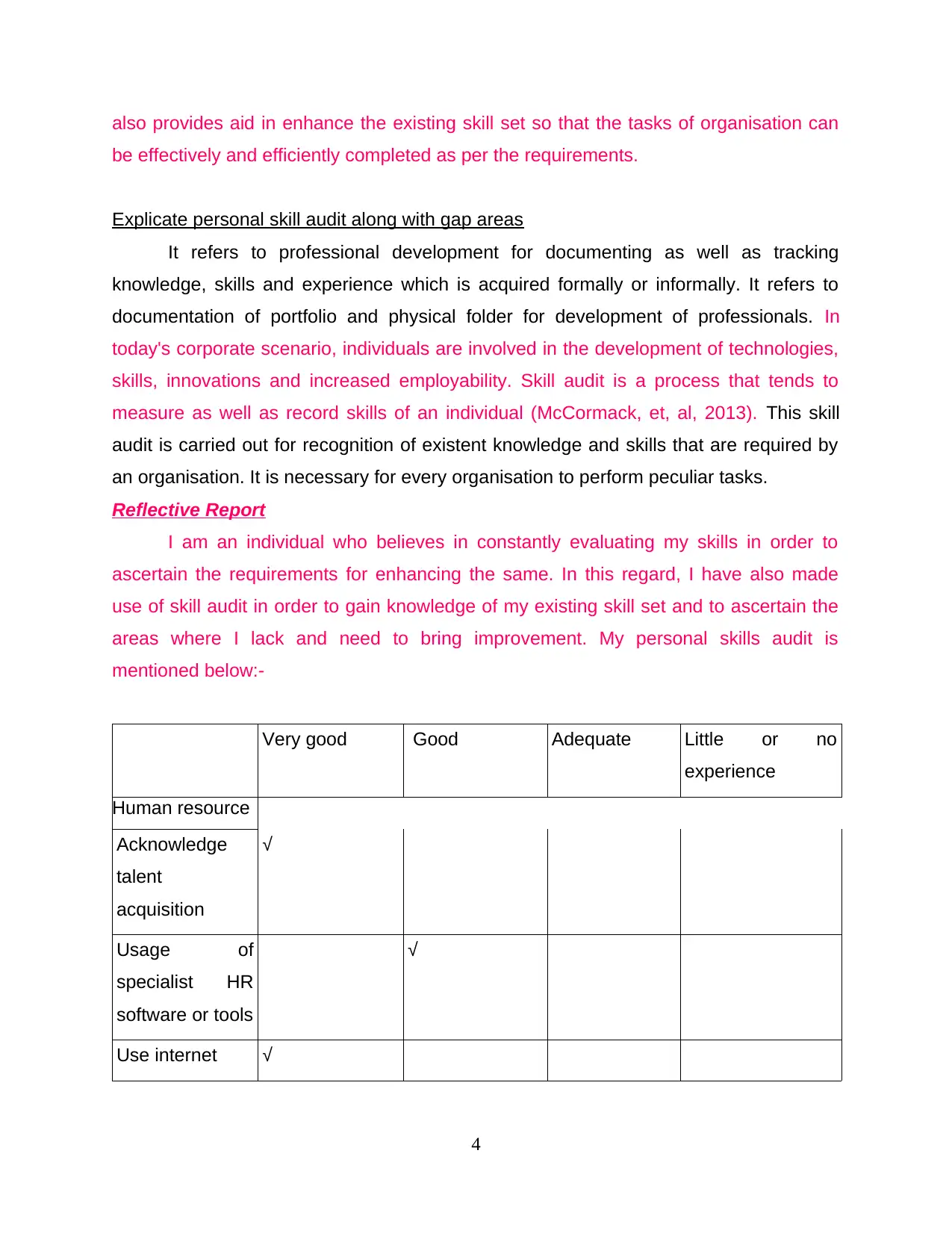
also provides aid in enhance the existing skill set so that the tasks of organisation can
be effectively and efficiently completed as per the requirements.
Explicate personal skill audit along with gap areas
It refers to professional development for documenting as well as tracking
knowledge, skills and experience which is acquired formally or informally. It refers to
documentation of portfolio and physical folder for development of professionals. In
today's corporate scenario, individuals are involved in the development of technologies,
skills, innovations and increased employability. Skill audit is a process that tends to
measure as well as record skills of an individual (McCormack, et, al, 2013). This skill
audit is carried out for recognition of existent knowledge and skills that are required by
an organisation. It is necessary for every organisation to perform peculiar tasks.
Reflective Report
I am an individual who believes in constantly evaluating my skills in order to
ascertain the requirements for enhancing the same. In this regard, I have also made
use of skill audit in order to gain knowledge of my existing skill set and to ascertain the
areas where I lack and need to bring improvement. My personal skills audit is
mentioned below:-
Very good Good Adequate Little or no
experience
Human resource
Acknowledge
talent
acquisition
√
Usage of
specialist HR
software or tools
√
Use internet √
4
be effectively and efficiently completed as per the requirements.
Explicate personal skill audit along with gap areas
It refers to professional development for documenting as well as tracking
knowledge, skills and experience which is acquired formally or informally. It refers to
documentation of portfolio and physical folder for development of professionals. In
today's corporate scenario, individuals are involved in the development of technologies,
skills, innovations and increased employability. Skill audit is a process that tends to
measure as well as record skills of an individual (McCormack, et, al, 2013). This skill
audit is carried out for recognition of existent knowledge and skills that are required by
an organisation. It is necessary for every organisation to perform peculiar tasks.
Reflective Report
I am an individual who believes in constantly evaluating my skills in order to
ascertain the requirements for enhancing the same. In this regard, I have also made
use of skill audit in order to gain knowledge of my existing skill set and to ascertain the
areas where I lack and need to bring improvement. My personal skills audit is
mentioned below:-
Very good Good Adequate Little or no
experience
Human resource
Acknowledge
talent
acquisition
√
Usage of
specialist HR
software or tools
√
Use internet √
4
⊘ This is a preview!⊘
Do you want full access?
Subscribe today to unlock all pages.

Trusted by 1+ million students worldwide
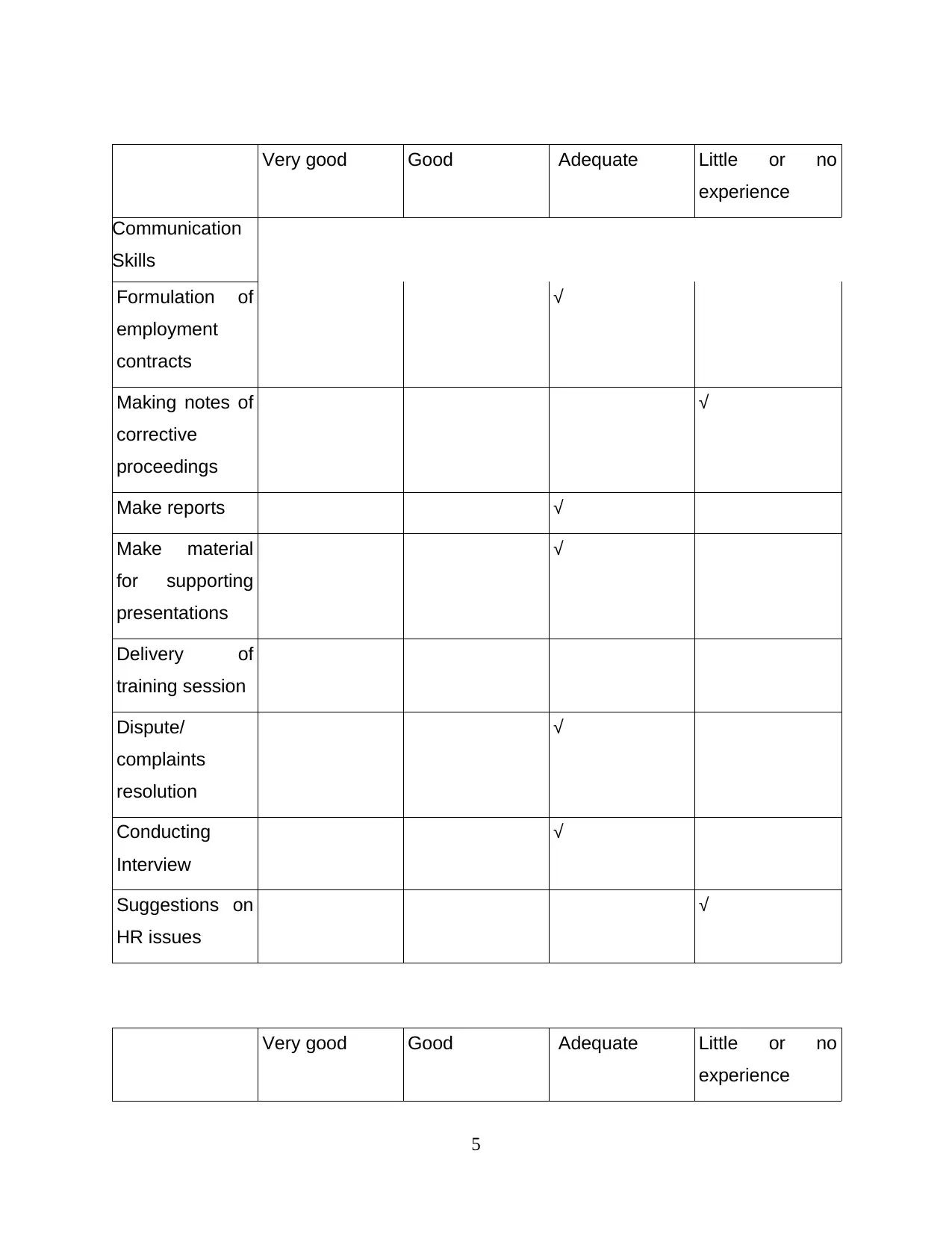
Very good Good Adequate Little or no
experience
Communication
Skills
Formulation of
employment
contracts
√
Making notes of
corrective
proceedings
√
Make reports √
Make material
for supporting
presentations
√
Delivery of
training session
Dispute/
complaints
resolution
√
Conducting
Interview
√
Suggestions on
HR issues
√
Very good Good Adequate Little or no
experience
5
experience
Communication
Skills
Formulation of
employment
contracts
√
Making notes of
corrective
proceedings
√
Make reports √
Make material
for supporting
presentations
√
Delivery of
training session
Dispute/
complaints
resolution
√
Conducting
Interview
√
Suggestions on
HR issues
√
Very good Good Adequate Little or no
experience
5
Paraphrase This Document
Need a fresh take? Get an instant paraphrase of this document with our AI Paraphraser
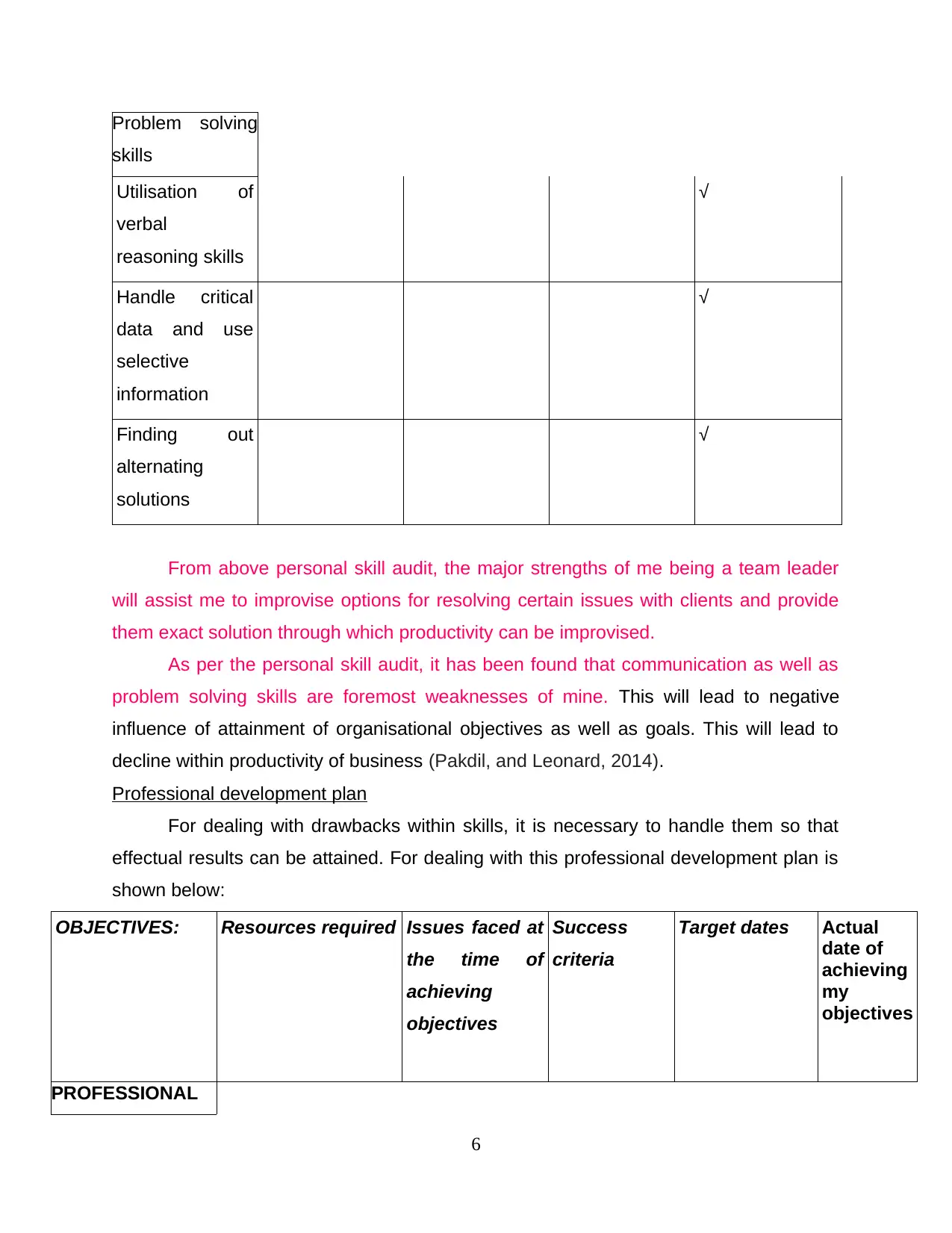
Problem solving
skills
Utilisation of
verbal
reasoning skills
√
Handle critical
data and use
selective
information
√
Finding out
alternating
solutions
√
From above personal skill audit, the major strengths of me being a team leader
will assist me to improvise options for resolving certain issues with clients and provide
them exact solution through which productivity can be improvised.
As per the personal skill audit, it has been found that communication as well as
problem solving skills are foremost weaknesses of mine. This will lead to negative
influence of attainment of organisational objectives as well as goals. This will lead to
decline within productivity of business (Pakdil, and Leonard, 2014).
Professional development plan
For dealing with drawbacks within skills, it is necessary to handle them so that
effectual results can be attained. For dealing with this professional development plan is
shown below:
OBJECTIVES: Resources required Issues faced at
the time of
achieving
objectives
Success
criteria
Target dates Actual
date of
achieving
my
objectives
PROFESSIONAL
6
skills
Utilisation of
verbal
reasoning skills
√
Handle critical
data and use
selective
information
√
Finding out
alternating
solutions
√
From above personal skill audit, the major strengths of me being a team leader
will assist me to improvise options for resolving certain issues with clients and provide
them exact solution through which productivity can be improvised.
As per the personal skill audit, it has been found that communication as well as
problem solving skills are foremost weaknesses of mine. This will lead to negative
influence of attainment of organisational objectives as well as goals. This will lead to
decline within productivity of business (Pakdil, and Leonard, 2014).
Professional development plan
For dealing with drawbacks within skills, it is necessary to handle them so that
effectual results can be attained. For dealing with this professional development plan is
shown below:
OBJECTIVES: Resources required Issues faced at
the time of
achieving
objectives
Success
criteria
Target dates Actual
date of
achieving
my
objectives
PROFESSIONAL
6
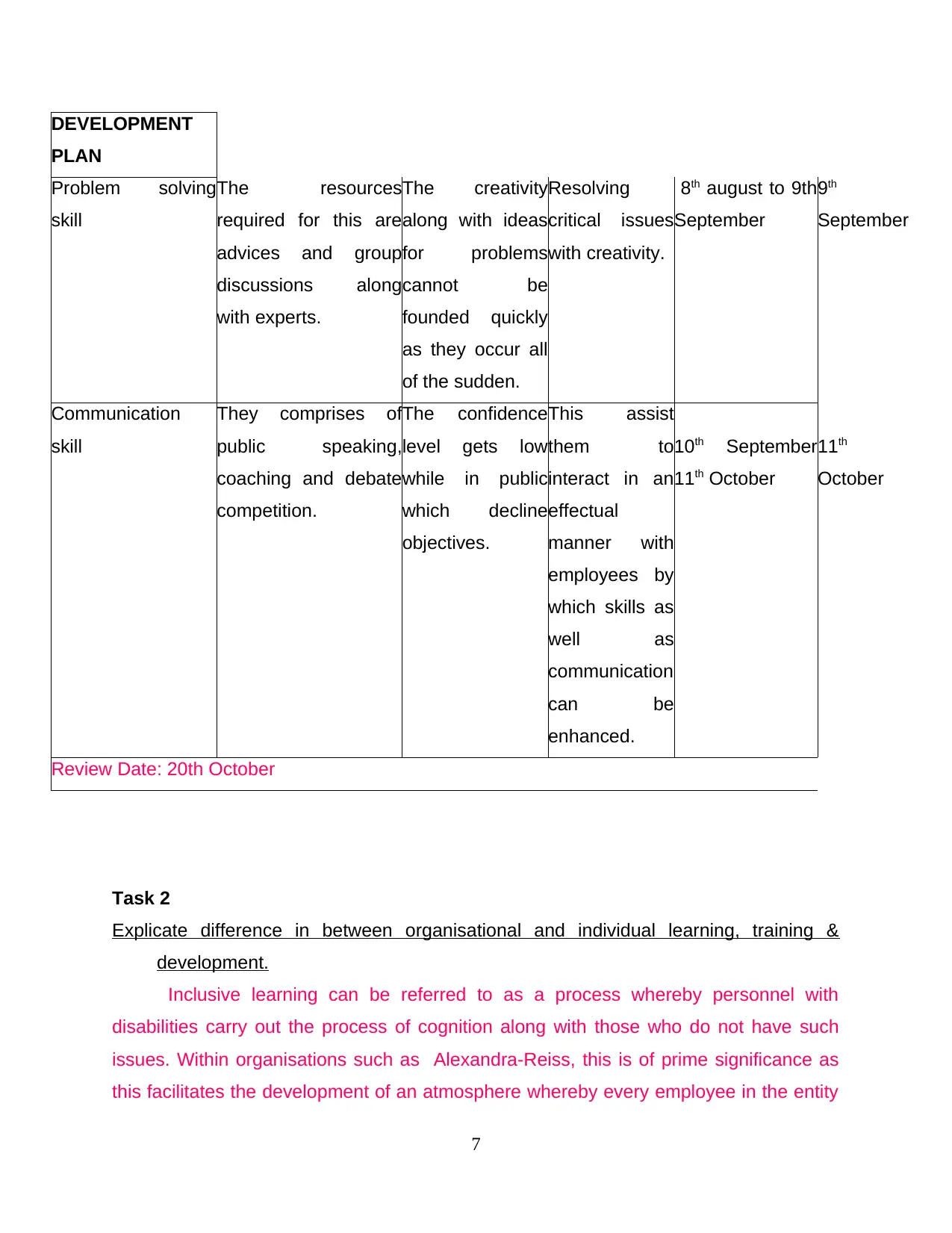
DEVELOPMENT
PLAN
Problem solving
skill
The resources
required for this are
advices and group
discussions along
with experts.
The creativity
along with ideas
for problems
cannot be
founded quickly
as they occur all
of the sudden.
Resolving
critical issues
with creativity.
8th august to 9th
September
9th
September
Communication
skill
They comprises of
public speaking,
coaching and debate
competition.
The confidence
level gets low
while in public
which decline
objectives.
This assist
them to
interact in an
effectual
manner with
employees by
which skills as
well as
communication
can be
enhanced.
10th September
11th October
11th
October
Review Date: 20th October
Task 2
Explicate difference in between organisational and individual learning, training &
development.
Inclusive learning can be referred to as a process whereby personnel with
disabilities carry out the process of cognition along with those who do not have such
issues. Within organisations such as Alexandra-Reiss, this is of prime significance as
this facilitates the development of an atmosphere whereby every employee in the entity
7
PLAN
Problem solving
skill
The resources
required for this are
advices and group
discussions along
with experts.
The creativity
along with ideas
for problems
cannot be
founded quickly
as they occur all
of the sudden.
Resolving
critical issues
with creativity.
8th august to 9th
September
9th
September
Communication
skill
They comprises of
public speaking,
coaching and debate
competition.
The confidence
level gets low
while in public
which decline
objectives.
This assist
them to
interact in an
effectual
manner with
employees by
which skills as
well as
communication
can be
enhanced.
10th September
11th October
11th
October
Review Date: 20th October
Task 2
Explicate difference in between organisational and individual learning, training &
development.
Inclusive learning can be referred to as a process whereby personnel with
disabilities carry out the process of cognition along with those who do not have such
issues. Within organisations such as Alexandra-Reiss, this is of prime significance as
this facilitates the development of an atmosphere whereby every employee in the entity
7
⊘ This is a preview!⊘
Do you want full access?
Subscribe today to unlock all pages.

Trusted by 1+ million students worldwide
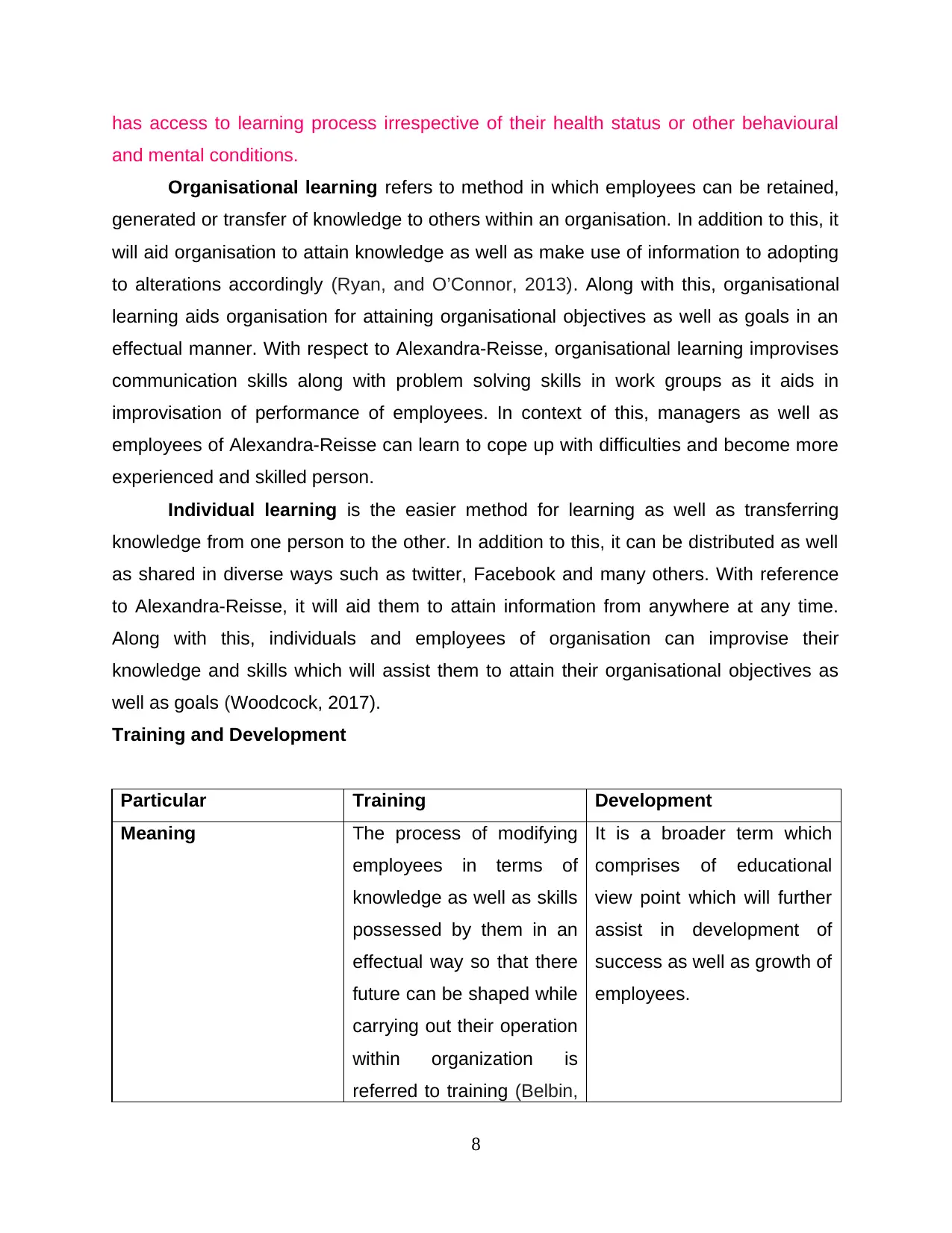
has access to learning process irrespective of their health status or other behavioural
and mental conditions.
Organisational learning refers to method in which employees can be retained,
generated or transfer of knowledge to others within an organisation. In addition to this, it
will aid organisation to attain knowledge as well as make use of information to adopting
to alterations accordingly (Ryan, and O’Connor, 2013). Along with this, organisational
learning aids organisation for attaining organisational objectives as well as goals in an
effectual manner. With respect to Alexandra-Reisse, organisational learning improvises
communication skills along with problem solving skills in work groups as it aids in
improvisation of performance of employees. In context of this, managers as well as
employees of Alexandra-Reisse can learn to cope up with difficulties and become more
experienced and skilled person.
Individual learning is the easier method for learning as well as transferring
knowledge from one person to the other. In addition to this, it can be distributed as well
as shared in diverse ways such as twitter, Facebook and many others. With reference
to Alexandra-Reisse, it will aid them to attain information from anywhere at any time.
Along with this, individuals and employees of organisation can improvise their
knowledge and skills which will assist them to attain their organisational objectives as
well as goals (Woodcock, 2017).
Training and Development
Particular Training Development
Meaning The process of modifying
employees in terms of
knowledge as well as skills
possessed by them in an
effectual way so that there
future can be shaped while
carrying out their operation
within organization is
referred to training (Belbin,
It is a broader term which
comprises of educational
view point which will further
assist in development of
success as well as growth of
employees.
8
and mental conditions.
Organisational learning refers to method in which employees can be retained,
generated or transfer of knowledge to others within an organisation. In addition to this, it
will aid organisation to attain knowledge as well as make use of information to adopting
to alterations accordingly (Ryan, and O’Connor, 2013). Along with this, organisational
learning aids organisation for attaining organisational objectives as well as goals in an
effectual manner. With respect to Alexandra-Reisse, organisational learning improvises
communication skills along with problem solving skills in work groups as it aids in
improvisation of performance of employees. In context of this, managers as well as
employees of Alexandra-Reisse can learn to cope up with difficulties and become more
experienced and skilled person.
Individual learning is the easier method for learning as well as transferring
knowledge from one person to the other. In addition to this, it can be distributed as well
as shared in diverse ways such as twitter, Facebook and many others. With reference
to Alexandra-Reisse, it will aid them to attain information from anywhere at any time.
Along with this, individuals and employees of organisation can improvise their
knowledge and skills which will assist them to attain their organisational objectives as
well as goals (Woodcock, 2017).
Training and Development
Particular Training Development
Meaning The process of modifying
employees in terms of
knowledge as well as skills
possessed by them in an
effectual way so that there
future can be shaped while
carrying out their operation
within organization is
referred to training (Belbin,
It is a broader term which
comprises of educational
view point which will further
assist in development of
success as well as growth of
employees.
8
Paraphrase This Document
Need a fresh take? Get an instant paraphrase of this document with our AI Paraphraser
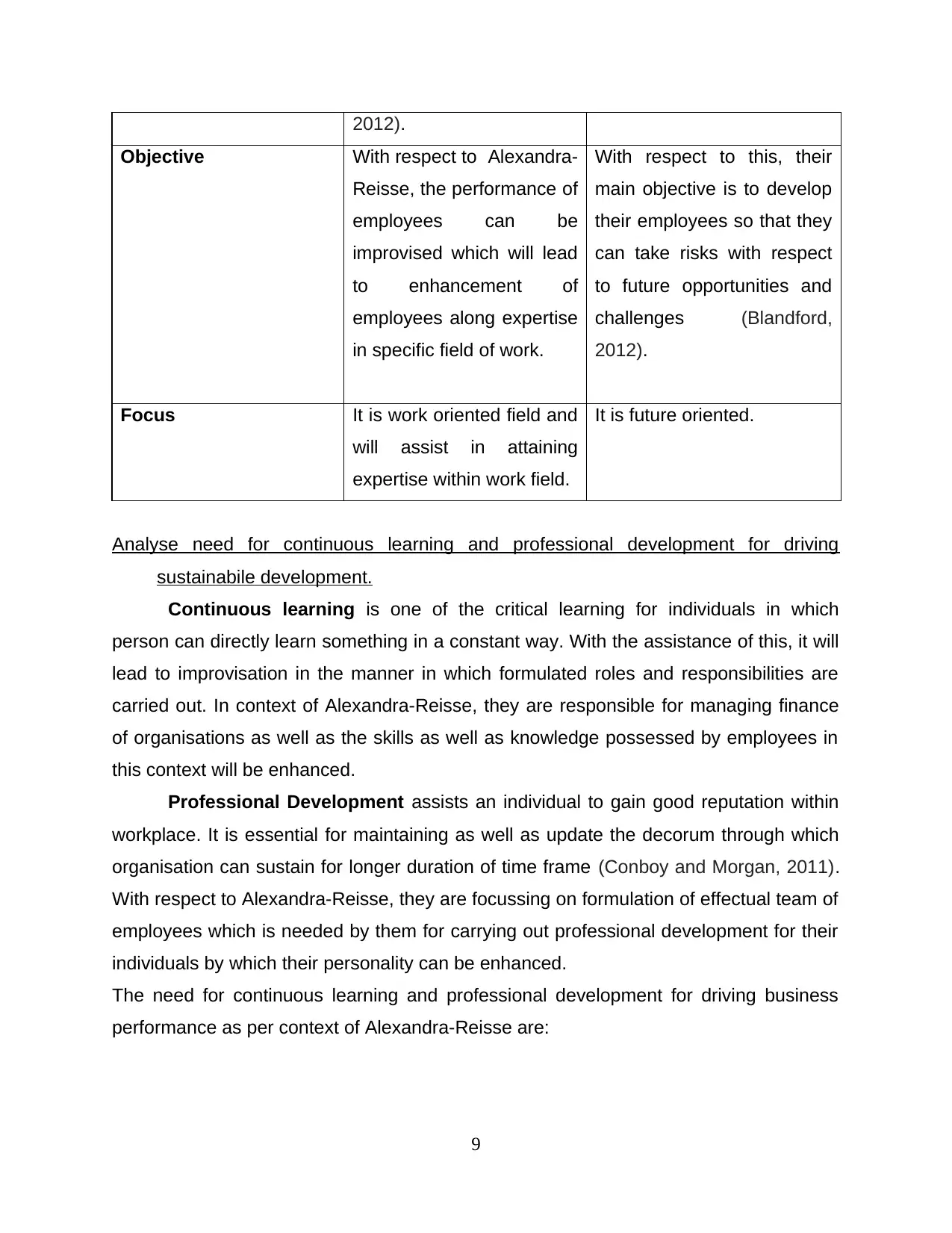
2012).
Objective With respect to Alexandra-
Reisse, the performance of
employees can be
improvised which will lead
to enhancement of
employees along expertise
in specific field of work.
With respect to this, their
main objective is to develop
their employees so that they
can take risks with respect
to future opportunities and
challenges (Blandford,
2012).
Focus It is work oriented field and
will assist in attaining
expertise within work field.
It is future oriented.
Analyse need for continuous learning and professional development for driving
sustainabile development.
Continuous learning is one of the critical learning for individuals in which
person can directly learn something in a constant way. With the assistance of this, it will
lead to improvisation in the manner in which formulated roles and responsibilities are
carried out. In context of Alexandra-Reisse, they are responsible for managing finance
of organisations as well as the skills as well as knowledge possessed by employees in
this context will be enhanced.
Professional Development assists an individual to gain good reputation within
workplace. It is essential for maintaining as well as update the decorum through which
organisation can sustain for longer duration of time frame (Conboy and Morgan, 2011).
With respect to Alexandra-Reisse, they are focussing on formulation of effectual team of
employees which is needed by them for carrying out professional development for their
individuals by which their personality can be enhanced.
The need for continuous learning and professional development for driving business
performance as per context of Alexandra-Reisse are:
9
Objective With respect to Alexandra-
Reisse, the performance of
employees can be
improvised which will lead
to enhancement of
employees along expertise
in specific field of work.
With respect to this, their
main objective is to develop
their employees so that they
can take risks with respect
to future opportunities and
challenges (Blandford,
2012).
Focus It is work oriented field and
will assist in attaining
expertise within work field.
It is future oriented.
Analyse need for continuous learning and professional development for driving
sustainabile development.
Continuous learning is one of the critical learning for individuals in which
person can directly learn something in a constant way. With the assistance of this, it will
lead to improvisation in the manner in which formulated roles and responsibilities are
carried out. In context of Alexandra-Reisse, they are responsible for managing finance
of organisations as well as the skills as well as knowledge possessed by employees in
this context will be enhanced.
Professional Development assists an individual to gain good reputation within
workplace. It is essential for maintaining as well as update the decorum through which
organisation can sustain for longer duration of time frame (Conboy and Morgan, 2011).
With respect to Alexandra-Reisse, they are focussing on formulation of effectual team of
employees which is needed by them for carrying out professional development for their
individuals by which their personality can be enhanced.
The need for continuous learning and professional development for driving business
performance as per context of Alexandra-Reisse are:
9
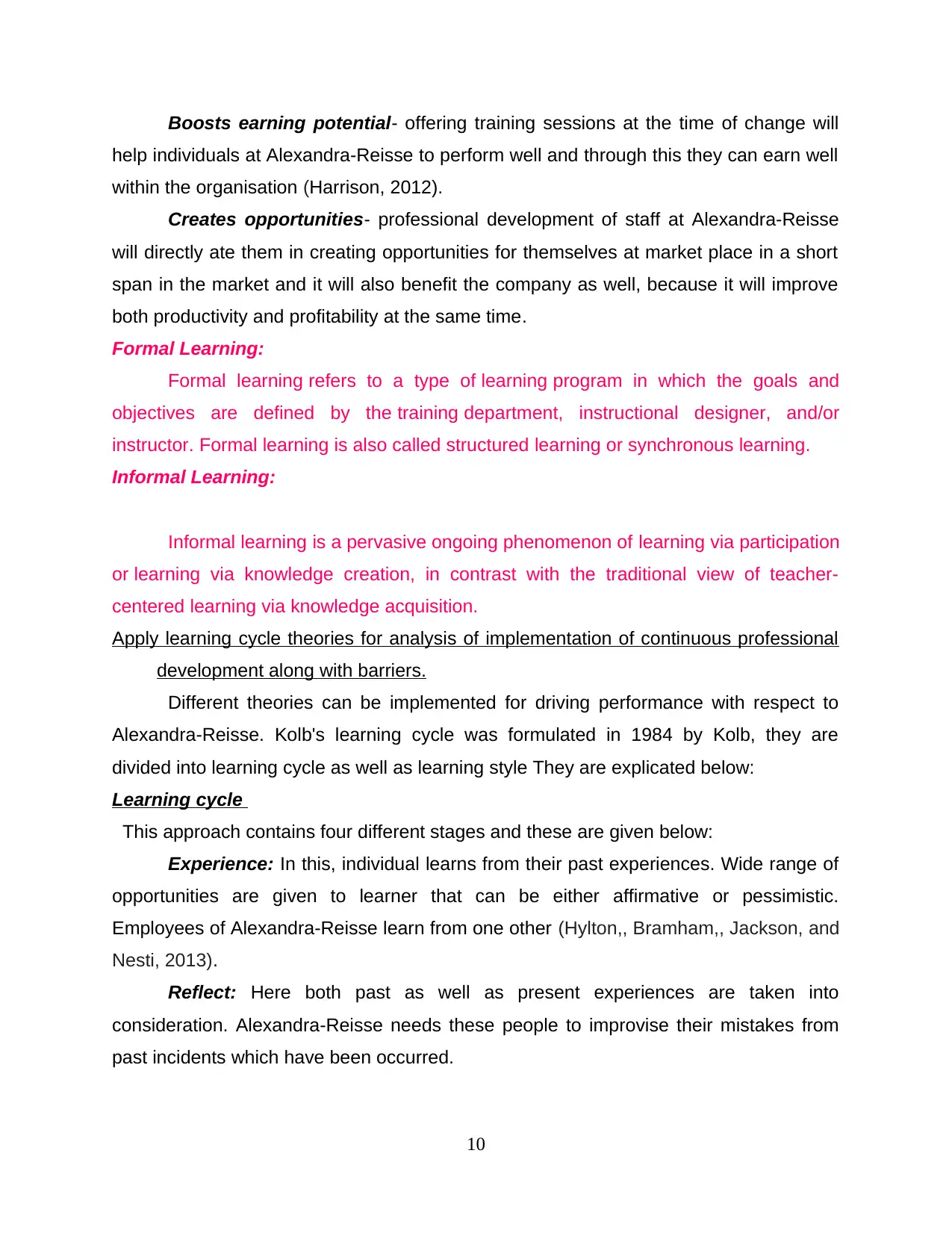
Boosts earning potential- offering training sessions at the time of change will
help individuals at Alexandra-Reisse to perform well and through this they can earn well
within the organisation (Harrison, 2012).
Creates opportunities- professional development of staff at Alexandra-Reisse
will directly ate them in creating opportunities for themselves at market place in a short
span in the market and it will also benefit the company as well, because it will improve
both productivity and profitability at the same time.
Formal Learning:
Formal learning refers to a type of learning program in which the goals and
objectives are defined by the training department, instructional designer, and/or
instructor. Formal learning is also called structured learning or synchronous learning.
Informal Learning:
Informal learning is a pervasive ongoing phenomenon of learning via participation
or learning via knowledge creation, in contrast with the traditional view of teacher-
centered learning via knowledge acquisition.
Apply learning cycle theories for analysis of implementation of continuous professional
development along with barriers.
Different theories can be implemented for driving performance with respect to
Alexandra-Reisse. Kolb's learning cycle was formulated in 1984 by Kolb, they are
divided into learning cycle as well as learning style They are explicated below:
Learning cycle
This approach contains four different stages and these are given below:
Experience: In this, individual learns from their past experiences. Wide range of
opportunities are given to learner that can be either affirmative or pessimistic.
Employees of Alexandra-Reisse learn from one other (Hylton,, Bramham,, Jackson, and
Nesti, 2013).
Reflect: Here both past as well as present experiences are taken into
consideration. Alexandra-Reisse needs these people to improvise their mistakes from
past incidents which have been occurred.
10
help individuals at Alexandra-Reisse to perform well and through this they can earn well
within the organisation (Harrison, 2012).
Creates opportunities- professional development of staff at Alexandra-Reisse
will directly ate them in creating opportunities for themselves at market place in a short
span in the market and it will also benefit the company as well, because it will improve
both productivity and profitability at the same time.
Formal Learning:
Formal learning refers to a type of learning program in which the goals and
objectives are defined by the training department, instructional designer, and/or
instructor. Formal learning is also called structured learning or synchronous learning.
Informal Learning:
Informal learning is a pervasive ongoing phenomenon of learning via participation
or learning via knowledge creation, in contrast with the traditional view of teacher-
centered learning via knowledge acquisition.
Apply learning cycle theories for analysis of implementation of continuous professional
development along with barriers.
Different theories can be implemented for driving performance with respect to
Alexandra-Reisse. Kolb's learning cycle was formulated in 1984 by Kolb, they are
divided into learning cycle as well as learning style They are explicated below:
Learning cycle
This approach contains four different stages and these are given below:
Experience: In this, individual learns from their past experiences. Wide range of
opportunities are given to learner that can be either affirmative or pessimistic.
Employees of Alexandra-Reisse learn from one other (Hylton,, Bramham,, Jackson, and
Nesti, 2013).
Reflect: Here both past as well as present experiences are taken into
consideration. Alexandra-Reisse needs these people to improvise their mistakes from
past incidents which have been occurred.
10
⊘ This is a preview!⊘
Do you want full access?
Subscribe today to unlock all pages.

Trusted by 1+ million students worldwide
1 out of 14
Related Documents
Your All-in-One AI-Powered Toolkit for Academic Success.
+13062052269
info@desklib.com
Available 24*7 on WhatsApp / Email
![[object Object]](/_next/static/media/star-bottom.7253800d.svg)
Unlock your academic potential
Copyright © 2020–2026 A2Z Services. All Rights Reserved. Developed and managed by ZUCOL.



